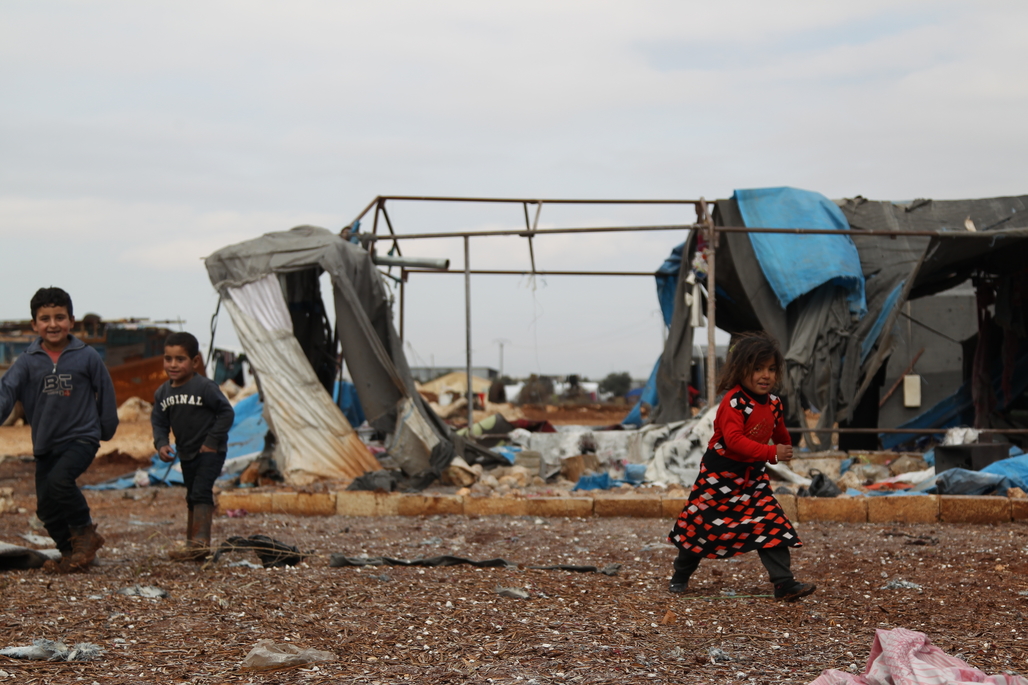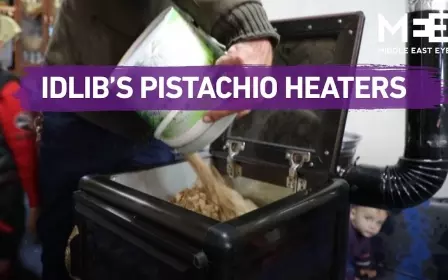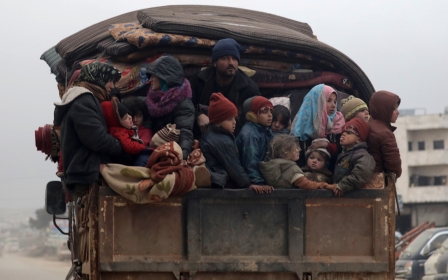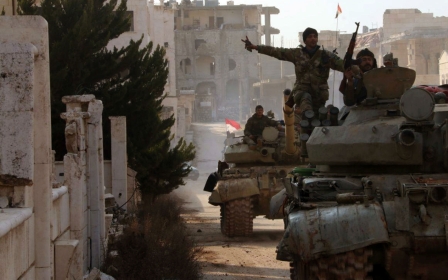‘Assad’s bombs chase us’: Syrian forces target refugee camps near Turkish border
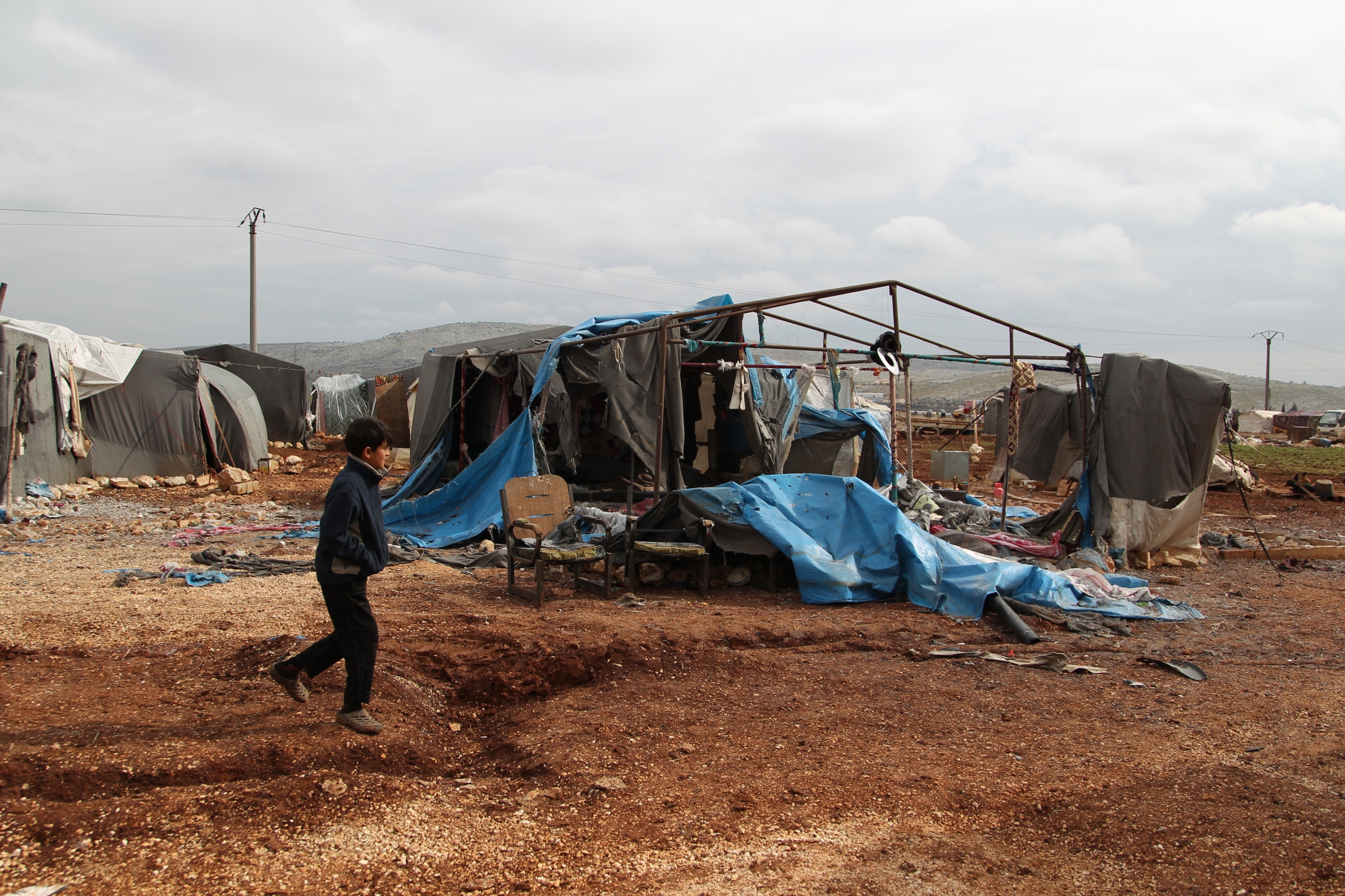
Abu Mohammed, a 30-year-old father of four, was resting for the first time in days.
Like thousands of Syrians, Mohammed and his family fled north towards the Turkish border, hoping to stay alive.
The Mohammeds' had fled al-Rafa, east of Idlib city, assuming the Turkish border area would give them a break from the ongoing military assault by forces loyal to Syrian President Bashar al-Assad.
'We never imagined Assad would strike us near the Syrian-Turkish border'
- Abu Mohammed, displaced father of four
But when Mohammed sat down on Friday with his extended family, hoping to escape the winter chill in the Faheel al-Izz camp for internally displaced people (IDP) near the town of Sarmada, the shelling began.
“The first shell fell fifty metres from our tent. I took my family and children to a nearby shelter,” Mohammed told Middle East Eye. “When we got to the shelter, we went underground to the basement. But another shell landed directly on top of us. Everything we owned was destroyed.
New MEE newsletter: Jerusalem Dispatch
Sign up to get the latest insights and analysis on Israel-Palestine, alongside Turkey Unpacked and other MEE newsletters
“We never imagined Assad would strike us near the Syrian-Turkish border.”
The attack on Faheel al-Izz injured three civilians and burnt down several tents in the camp.
A day later, the Syrian government bombed another camp, al-Muthanna, in the West Aleppo countryside near the Turkish border, this time killing one civilian and injuring four, according to eyewitnesses and Syria-based Thiqa news agency.
For Mohammed, the bombing of Faheel al-Izz was unexpected but not out of the blue.
Earlier on Friday, Omar Rahmoun, a former revolutionary turned government insider, had called on refugees to flee camps near the Bab al-Hawa border crossing.
“Anyone in camps inside Bab al-Hawa or east of Bab al-Hawa must leave immediately,” Rahmoun, who heads the Assad-backed National Reconciliation committee, said in a Twitter post.
Rahmoun’s warning created panic and uncertainty inside the camps, with many of the displaced puzzled by the idea that the Syrian government was targeting areas near the Turkish border.
Last week’s attacks on IDP camps near the Turkish border marked the first time in years the area near Sarmada was attacked by pro-government forces, according to the Syrian Network for Human Rights.
Earlier this week, the United Nations said nearly one million people had been displaced multiple times since December trying to outrun Assad’s offensive, with UN human rights chief Michele Bachellet warning that "no shelter is now safe".
'We are talking about a population the size of Marseille in France moving within a few weeks to the middle of nowhere'
- Isham Kateb, executive director, Kesh Malik
“The displacement is immense. We are talking about a population the size of Marseille in France moving within a few weeks to the middle of nowhere, to an area that lacks the services needed,” Issam Khatib, executive director of civil society organisation Kesh Malek, told MEE.
While Turkey has said it will not host the displaced, Syrians are fleeing as fast as they can hoping to escape the cold and Assad.
The level of displacement has led to informal settlements popping up in spaces across the border area within Syria.
Yakzan Shishakly, executive director of the US-registered non-profit Maram Foundation, noted the increase in informal settlements emerging across Idlib, with civilians carrying their tents and possessions with them as they flee the military onslaught.
"People are worried about shelling and afraid for their lives, especially with reports that the regime will head north."
Impact on aid delivery
A major concern raised by attacks in areas near the Turkish border is the impact it will have on humanitarian agencies delivering aid to the displaced.
Selim Tosun, a Syria coordinator for Turkish NGO IHH, warns that government attacks near the border will “interrupt” operations and “cut off the road between the Afrin and Idlib”.
“If that happens, the refugees would be stuck in the border area,” said Tosun.
Khatib said that the military targeting of camps has led to a "paralysis" of aid being delivered to the displaced population near the Turkish border.
"Airplanes are targeting anything that moves between these areas, making the possibility of responding to the needs of a million people, which involves huge resources and logistics, very hard," said Khatib.
'I can bear the cold, but how can my children? I don’t want to see them die from the cold'
- Abu Mohammed, displaced father of four
A spokesperson for the Red Cross told MEE that the scenes unfolding in northwest Syria were “some of the worst” it had seen since the start of the Syrian conflict in terms of displacement and dangers faced by civilians.
The spokesperson also noted how existing shelters were unable to accommodate the rising number of displaced and said it "remains very challenging for humanitarian organisations to reach them and address their needs."
Since 2012, Bab al-Hawa has been a major crossing for aid agencies, providing aid through Turkey to Syrians displaced because of the fighting.
Shishakly feared the “targeting of IDP camps near Bab al-Hawa will hinder our work and prevent us from accessing key sites".
"It puts us on edge knowing the regime can be so close, but the real issue is ensuring displaced people - most of whom are women and children going through multiple traumas - have a safe place to go," he added.
For Mohammed, his immediate priority is now protecting his family, hoping they survive both the bombs and the cold.
“I can bear the cold, but how can my children?" said Abu Mohammed, as he held his children close to stay warm. "I don’t want to see them die from the cold. But wherever we go, Assad’s bombs continue to chase us. There is nowhere to go.”
Additional reporting by Ragip Soylu in Turkey.
Middle East Eye delivers independent and unrivalled coverage and analysis of the Middle East, North Africa and beyond. To learn more about republishing this content and the associated fees, please fill out this form. More about MEE can be found here.


